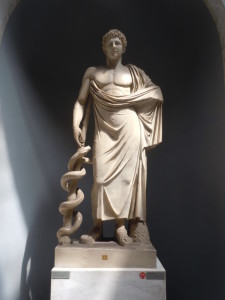This past Monday marked the 2000th anniversary of Augustus’ death, as you likely already know from the #aug2k hashtag, the massive exhibition about the guy in Rome, or from just being great at remembering dates. Whatever you think of his methods, it’s indisputable that Augustus had a stabilizing effect on the Roman empire: before he took control, Rome had endured over a century of near constant political violence.
Many scholars have attributed the restabilization of Rome to Augustus’ signature blend of iconography, mythography, and ruthless behind-the-scenes politics. All of this was important, of course, but I’d argue that the single most important thing Augustus did in his reign was stay alive. The emperor died at age 75, a happy accident for a man who repeatedly faced the battlefield and assassination attempts. More impressively, he did it all in poor health.
Augustus had suffered bouts of sickness since he was a boy, most notoriously during the 42 BC Battle of Philippi. In 23 BC, after Augustus had wrested power from his former ally Antony, restored peace in the empire, and been awarded unprecedented political power by the senate and people of Rome, he also came perhaps the closest to death he’d ever been. Cassius Dio (Histories 53.30.1) tells us that Augustus was “so ill as to have no hope of recovery.”
Fortunately for Augustus and for the empire as a whole, he pulled through and went on to live another 37 years. All of the ancient authors who wrote about this episode attributed Augustus’ recovery to Antonius Musa, a freedman and a doctor. Musa treated the emperor by, in the words of Pliny the Elder, “reversing the treatment”: he had Augustus take cold baths rather than hot ones.
When Augustus got better, Dio tells us:
Musa received a great deal of money from both Augustus and the senate, as well as the right to wear gold rings (for he was a freedman), and he was granted exemption from taxes, both for himself and for the members of his profession, not only those living at the time but also those of future generations.
Suetonius (Augustus 59) adds:
In honour of his physician, Antonius Musa, through whose care he had recovered from a dangerous illness, a sum of money was raised and Musa’s statue was set up beside that of [the healing god] Aesculapius.
Why such lavish honors? For Augustus’ partisans, the health of the emperor meant a lot more than just the wellbeing of the man himself. In 23 BC Augustus had no heir — he never had a son, and (because they had not yet been born) he had not yet adopted his daughter’s children Gaius and Lucius. If he died, power would be split between his co-consul Calpurnius Piso and his right hand man Marcus Agrippa. And if there was one thing the Romans had learned in the past several decades — not least from Augustus himself — it was that shared power tended not to work so well when the stakes were high.
Musa’s treatment probably wasn’t what cured Augustus; it’s likely that the emperor would have recovered anyway, as he had several times before. But he certainly thought he was near death, and that it was the doctor’s baths that restored his health. To Augustus and the people of Rome, Antonius Musa had saved the empire. And who knows — maybe without the cold baths we would have commemorated Augustus’ death in 1977.


